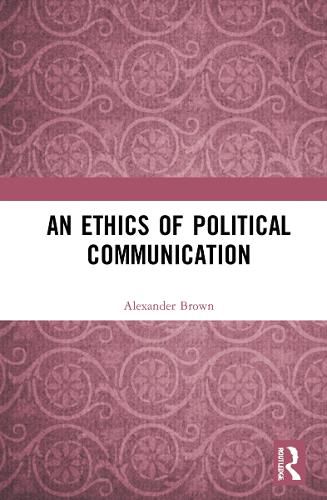Readings Newsletter
Become a Readings Member to make your shopping experience even easier.
Sign in or sign up for free!
You’re not far away from qualifying for FREE standard shipping within Australia
You’ve qualified for FREE standard shipping within Australia
The cart is loading…






Working in the tradition of analytic philosophy, Alexander Brown argues that many different forms of political communication (or anti-communication) that often infuriate the public can also be ethically or morally objectionable. These forms include question dodging, offering scripted answers, stonewalling, not listening, disseminating propaganda, pandering, being insincere, giving false denials, issuing revisionist interpretations, refusing to take responsibility, never apologising, boasting, and gaslighting. Brown invokes a host of normative reasons including those having to do with epistemic arrogance, interference in autonomy, and violating the right to be heard. This is not to say that, all things considered, politicians should never engage in dubious political communication. Sometimes these are necessary evils. Brown argues, however, that further moral inquiry is needed to show why they are evils, and to determine when the use of these rhetorical tactics can be excessive, unreasonable, or out of place.
Key Features: * Identifies and conceptualises forms of dubious political communication * Develops an ethical evaluation of political communication * Considers possible justifications for the use of dubious political communication * Makes practical recommendations on how to regulate unethical political communication
$9.00 standard shipping within Australia
FREE standard shipping within Australia for orders over $100.00
Express & International shipping calculated at checkout
Working in the tradition of analytic philosophy, Alexander Brown argues that many different forms of political communication (or anti-communication) that often infuriate the public can also be ethically or morally objectionable. These forms include question dodging, offering scripted answers, stonewalling, not listening, disseminating propaganda, pandering, being insincere, giving false denials, issuing revisionist interpretations, refusing to take responsibility, never apologising, boasting, and gaslighting. Brown invokes a host of normative reasons including those having to do with epistemic arrogance, interference in autonomy, and violating the right to be heard. This is not to say that, all things considered, politicians should never engage in dubious political communication. Sometimes these are necessary evils. Brown argues, however, that further moral inquiry is needed to show why they are evils, and to determine when the use of these rhetorical tactics can be excessive, unreasonable, or out of place.
Key Features: * Identifies and conceptualises forms of dubious political communication * Develops an ethical evaluation of political communication * Considers possible justifications for the use of dubious political communication * Makes practical recommendations on how to regulate unethical political communication